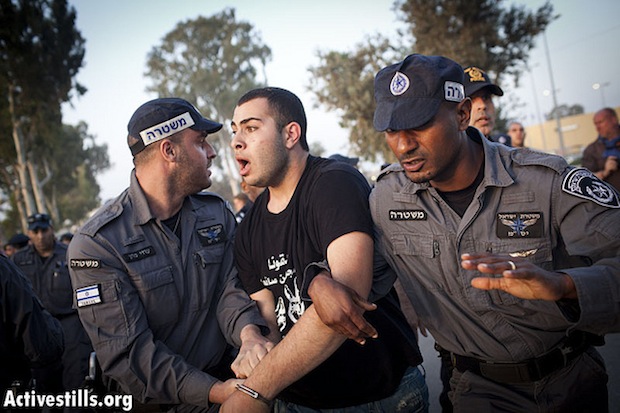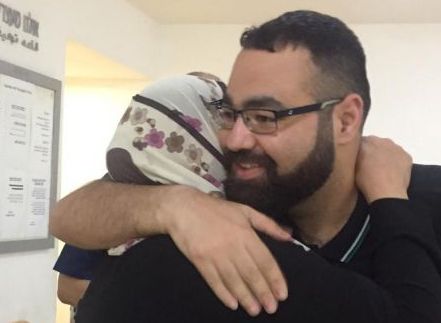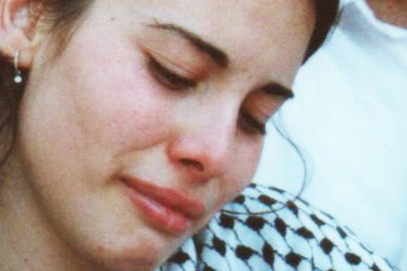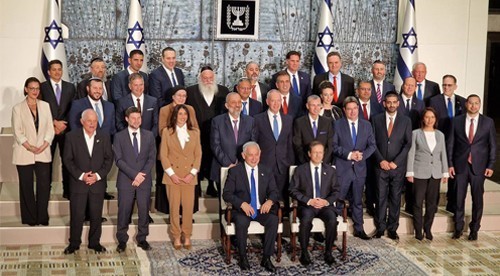Adalah files complaint: Israeli police used brutal, excessive force against Haifa protesters
Adalah – The Legal Center for Arab Minority Rights in Israel submitted a complaint on 23 May 2018, to the Justice Ministry’s Police Investigation Department (PID) demanding an investigation into the excessive force used by Israeli police to disperse the demonstration that took place in Haifa on Friday evening, 18 May 2018.
According to the complaint, submitted by Adalah Attorney Fady Khoury, “Police used excessive force to break up the demonstration after surrounding the demonstrators and pushing them into a very tight space. This is despite the fact that the protest was legal and did not need a license because it did not involve a march from one location to another or the delivery of speeches.”
Adalah stressed that, “The use of violence by the police did not end with the dispersion of the demonstrators and illegal arrests of 21 people, but continued with the assault of detained protesters during their transfer to the police station and inside the station, even though they had been restrained with metal or plastic handcuffs.”
Many detained protesters told Adalah that they asked for medical treatment for their wounds, but that their requests were denied. Only seven of the 21 detained protesters received any treatment, and they were taken to the hospital after spending hours in detention.
Some of them were inside a police car that was involved in a road accident that took place during their transfer from the detention site to the police station. Others were medically examined only a day after their arrest while they were being processed at Jalameh (Kishon) prison.
Attorney Khoury contended that, “From the time of their arrest and their transfer to Jalameh prison the following day, the detainees were subjected to severe violence, brutal and vindictive treatment and insults by the police officers… [This included] violent treatment by police officers even while they were receiving medical treatment in hospital, which raises suspicions that police officers committed criminal offenses.”
The complaint included testimony about specific cases of police violence against the protestors, including the striking of detained protester Yoram Bar Haim by police officer Lior Hatam with plastic cuffs while he was sitting on the ground and handcuffed in the police station, because he had asked the police, in front of the other detainees, not to use violence and brutality against them.
The same policeman (Lior Hatam) also assaulted Bissan Farah and hit him against a table after lifting him up and throwing him down several times at the police station, disregarding the fact that Bissan had been involved in a road accident during his transfer to the police station together with detained protestors Nayef Shakour and Majd Farah. The accident occurred due to the excessive speeding of the police officer; he ran through a number of red lights and hit another car, on the left-hand side where Majd Farah had been sitting.
Despite the car crash, police officers kept the three protesters in the car for a while, and then transferred them to the police station, although Bissan was unable to walk and had a wound to his face that was bleeding profusely, and could not see properly. Bissan was transferred to the hospital after a long time, even though he needed urgent medical treatment. Even in the hospital, the police kept him shackled in handcuffs, only removing them twice for a short period at the doctor's request.
Bissan Farah was arrested while he filming police brutality during the demonstration, and the police threatened to break his arm during the arrest.
The most violent attack was on Mossawa Center Director Jafar Farah. He was transferred to hospital several hours later after being hit by a policeman on the left knee. The medical reports confirmed that he had suffered a fractured knee and possible damage to the aorta (heart).
Adalah obtained testimonies from medical staff members at the Bnei Zion Hospital in Haifa, to which Jafar Farah was transferred. They stated that the police officers who were present had hurled insults at Farah and at a number of medical professionals, and subjected them to verbal abuse and racism. A police officer even told one hospital worker, who was wearing a hijab, “It’s clear that you are inciting everyone here.” Police told a doctor who asked for Farah’s handcuffs to be removed, that “Your request will be taken to court and if there turns out to be no medical basis for it you’ll pay for it.” The hospital staff also witnessed the police ridiculing and laughing at a doctor whose hand was trembling as he wrote down the order to remove the handcuffs.
Police prohibited family members from seeing Farah in the hospital, and then compelled the doctor to sign papers releasing him from the hospital under pressure.
Farah received medical treatment in the hospital while in shackles, contrary to medical regulations, by order of police officers, who refused to remove them. His sudden release from the hospital came under police pressure and not on the basis of the professional considerations of the medical staff, who confirm that Farah should have stayed in the hospital for three days and been examined by a specialist doctor.
In another case, protestor Nayef Shakour was assaulted during his arrest, despite not resisting arrest, and was one of the detainees who were involved in the road accident. Nevertheless, he was taken to hospital for treatment only several hours later, and was subjected to brutal and racist treatment by police for speaking in Arabic with a medical professional. They told him, “This is a state of the Jews” and called him a “vandal.”
Majd Farah, who was the third detainees in the police car involved in the accident, stated that the police officer had been driving the car at high speed and ran through several red lights. He sustained an injury to the head during the accident, but the police kept him in the car and refused to transfer to hospital until he had been interrogated, despite his request and urgent need for medical treatment.
The arrest of Ammar Abu Qandeel involved extreme and unjustified violence. Police officers beat him using their fists and another solid object, even though he did not resist his arrest. Abu Qandeel stressed that one of the policemen had told him when he came out of the police car, “It has finally happened. We’ve been waiting for you for a week.”
Abu Qandeel stated that police officer Lior Hatam stood in front of him while he was sitting on a chair in handcuffs at the police station, and began threatening him and waving his hands around in an intimidating manner, after Abu Qandeel had asked him to stop being violent towards the detainees. Officer Hatam also spit at detainees and swore at them when they asked for water.
Fadi Andraus stated that he had tried to provide assistance to one of the young women who had fallen to the ground after security forces began pushing and enclosing the detainees, when he was suddenly assaulted by police using batons and fists. They arrested him after knocking him to the ground.
Ali Mawasi stated that police officer Lior Hatam told the detainees, “We’ll hold a party for you today (...)”, and went on to swear and spit at them, calling them “sons of bitches”. Another police officer named Ilan joined him in shouting, swearing and spitting at the detainees.
All the detainees were handcuffed using plastic handcuffs in a manner that cut of the blood supply to their hands. Police officers pulled and tightened the handcuffs after some of the detainees complained. Police also refused to the remove the handcuffs during the detainees’ meetings with their lawyers.
Police denied the detainees food and drink throughout the night they spent at the police station.
The detainees' testimonies indicate that this ill-treatment, and the insults and curses that police officers illegally subjected them to, were racist in nature.
Attorney Khoury stressed that, “These incidents are just a part of the complete picture, and do not fully reflect the police violence that was used to break up the demonstration, during the arrest of the detainees, at the police station, and in the hospital.”
CLICK HERE to read the complaint [Hebrew]
CLICK HERE to watch a video of Israeli police violence at the Haifa protest

















